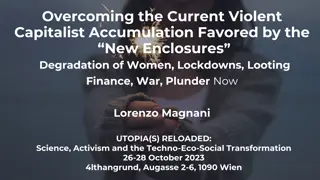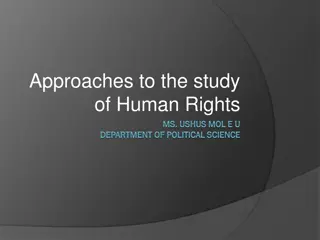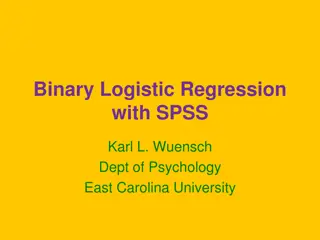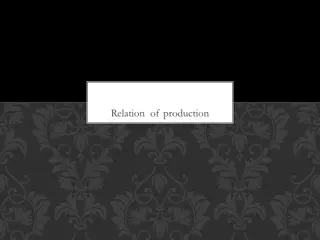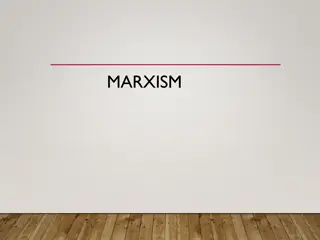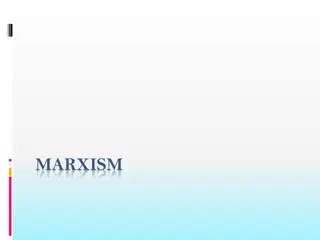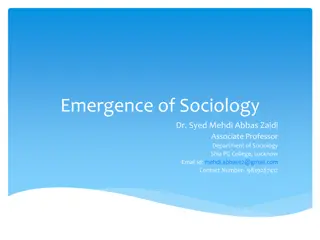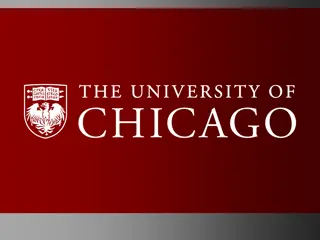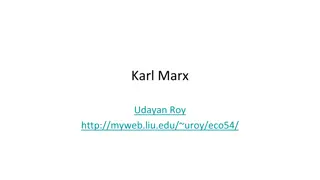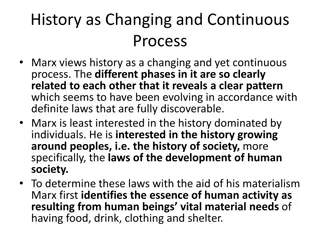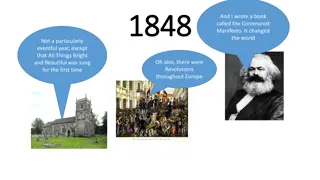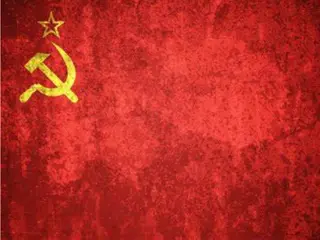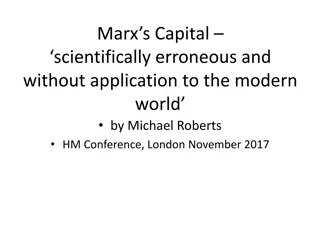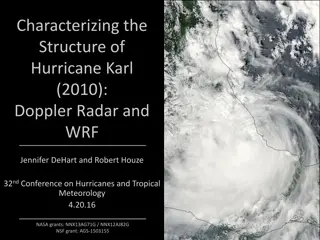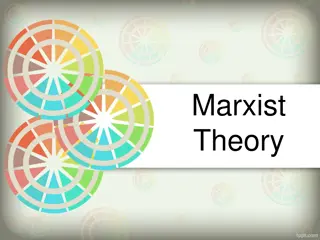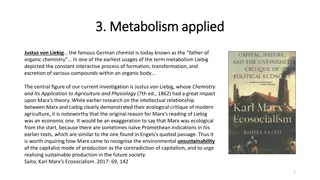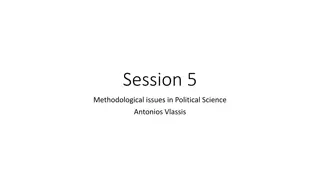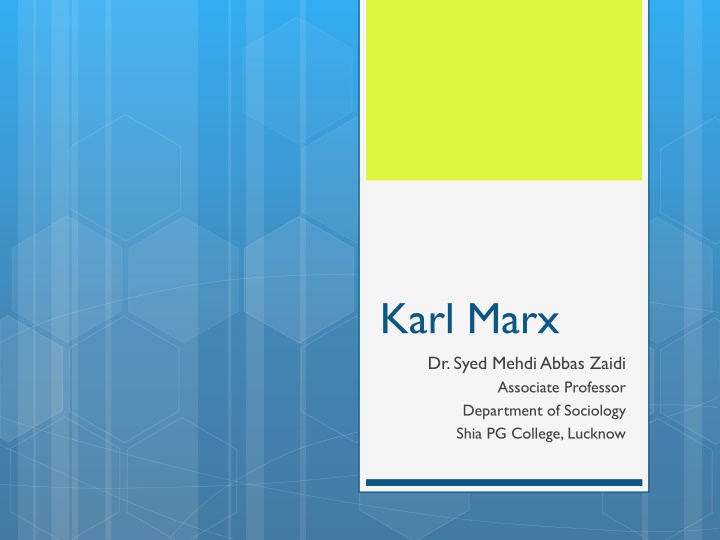
Karl Marx's Dialectical Materialism and Major Works
Explore Karl Marx's contributions to modern socialism and communism, including his philosophy of Dialectical Materialism and analysis of the economy. Learn about Marx's major works, Hegel's Dialectics, Feuerbach's Materialism, and the concept of unity and struggle of opposites in Marxist ideology. Gain insights into the dialectical process and the laws governing Marxist dialectics.
Download Presentation

Please find below an Image/Link to download the presentation.
The content on the website is provided AS IS for your information and personal use only. It may not be sold, licensed, or shared on other websites without obtaining consent from the author. If you encounter any issues during the download, it is possible that the publisher has removed the file from their server.
You are allowed to download the files provided on this website for personal or commercial use, subject to the condition that they are used lawfully. All files are the property of their respective owners.
The content on the website is provided AS IS for your information and personal use only. It may not be sold, licensed, or shared on other websites without obtaining consent from the author.
E N D
Presentation Transcript
Karl Marx Dr. Syed Mehdi Abbas Zaidi Associate Professor Department of Sociology Shia PG College, Lucknow
Karl Marx (5 May 1818 - 14 March 1883) Father of modern socialism, communism, and conflict theory. Marxism is a Western intellectual tradition spanning 150 years, consisting of 3 components: 1. A political doctrine 2. A philosophy (or anti- philosophy) of History 3. And an analysis of the functioning of the economy
Dialectical Materialism In simplified form, Dialectical Materialism states that ideas and thoughts of human changes in a dialectical process due to the movement and existence of the matter. Dialectical Materialism is not only a philosophy but also a complete way of thinking to explain the reality.
Hegels Dialectics & Feuerbachs Materialism Marx & Engels embraced Hegel s notion of dialectical change over rigid metaphysics, but they rejected his idealist interpretation of history. They adopted Feuerbach s materialism, but rejected his passive, determinist view of history.
Dialectics: Unity & Struggle of Opposites Materialist dialectics is a way of conceptualizing change in everything: in nature, in history & in thought. Change is the inevitable process of struggle, contradiction & tension between opposite, yet unified mutually transforming forces. Contradiction transforms each side, both negating & producing into a new conflicting unity. Something old is transformed into something new. Quantitative & Qualitative change are dialectically related to each other.
Dialectical Process In general terms a thesis is a starting point, an antithesis is a reaction to it and a synthesis is the outcome. The movement from one stage to another in society could be explained by using thesis, antithesis and synthesis. The outcome, in the long term would be a new form of relations within a classless society, namely communism. This would be the synthesis.
The Law of Dialectics The Law of Unity of Conflict of Opposes. The Law of Passage of Quantitative Changes into Qualitative Changes. The Law of Negation of Negation.
Historical Materialism Marx identifies production as essential for human existence. Production is a social activity. Co-operation is of importance Divisions of Labor : Different People have different jobs. Production has to be organized or managed . Different forms of production: modes of production=different type of society.
Continuum How stuff is produced is what matters most. This is the base of society. Marx calls the rules, customs, laws, and beliefs determining how the wealth should be distributed, the superstructure. Economic base : Economic relations determine social relations, and social institutional practices (i.e. superstructure).
Continuum The system of class division is dependent on mode of production. Society moves from stages to stages when the dominant class is displaced by a new emerging class. Mode of production also determines all expressions of civilization : Law, Philosophy, art, Religion etc. There is a distinction between means of production and the relations of production.
Means and Relations of Production The means of production Land Natural resources Technology Relations of production The social and technical relationships people enter into. As they acquire and use the means of production. The comprised not only relations among individual, but between among groups of people or classes. 1. 2. 3. 1. 2.
Social Superstructure Ways of thinking ,values, ideas Forms of social consciousness Ideologies Social Institutions Religion Family Education Media Government /the state
Continuum Economic base shapes the social Superstructures. The economic base is controlled by ruling class. Superstructure is also controlled by ruling class. Social institutions serves ruling class interests.
Types of Modes of Production Primitive Communism Primitive society, no classes, very low divisions of labor. All work together for common good. Ancient(slave) mode of production Ancient Greece and Rome Aristocracy and slaves Slaves do most of work
Continuum Feudal mode of production(feudalism) Medieval Europe Feudal landlords and peasants Peasants do all the work Capitalist mode of Production(capitalism) Capitalists and workers (Bourgeoisie and proletariat) Socialism/Communism No classes: equality
Forces of Production The forces of production express the degree to which human beings control nature. The more advanced the productive forces are, greater is their control over the nature and vice versa. According to Marx, the forces of production includes means of production and labour power. The forces of production, according to Marx, include means of production and labour power.
Continuum In every social order there is a continuous change in the material forces of production. The development of the forces of production is primary because it results from a factor, which is, in a sense, exogenous. Productive forces have an intrinsic tendency to develop, as human beings knowledge and mastery over nature increase.
Relation between Base and Superstructure In Marxist theory, society consists of two parts: the base (or substructure) and superstructure. The base comprises the forces and relations of production (e.g. employer employee work conditions, the technical division of labour, and property relations) into which people enter to produce the necessities and amenities of life. The superstructure determines society's other relationships and ideas to comprise its superstructure, including its culture, institutions, political power structures, roles, rituals, and state.
Continuum While the relation of the two parts is not strictly unidirectional, as the superstructure often affects the base, the influence of the base is predominant. Marx and Engels warned against such economic determinism.
The Social Class According to Marx, Class is the manifestation of economic differentiation. A class is defined by the ownership of property. Such ownership vests a person with the power to exclude others from the property and to use it for personal purposes. In relation to property there are three great classes of society: The bourgeoisie (who own the means of production such as machinery and factory buildings, and whose source of income is profit), landowners (whose income is rent), and The proletariat (who own their labor and sell it for a wage). 1. 2.
Continuum Class thus is determined by property, not by income or status. These are determined by distribution and consumption, which itself ultimately reflects the production and power relations of classes.
Class Consciousness The self-understanding of members of a social class. This modern sociological concept has its origins in, and is closely associated with, Marxist theory. Karl Marx distinguished between a class in itself and a class for itself . A class in itself is simply a social group whose members share the same relationship to the means of production .Karl Marx argued that a social group only fully becomes a class when it becomes a class for itself.
Continuum At this stage, its members have class consciousness and class solidarity. Class consciousness means that false class consciousness has been replaced by a full awareness of the true situation, by a realization of the nature of exploitation.
Class Struggle According to Marx, the history of all hitherto existing society is the history of class struggle. Freeman and, slave, patricians and plebian, lord and serf, guild master and journey man, in a word, oppressor and the oppressed stood in constant opposition to one another, carried on uninterrupted now hidden and now open fight, a fight that each time ended in a revolutionary reconstitution of society at large, or in common ruin of the contending classes.
Continuum The perpetual tension, conflict or the antagonism between the owning and the non-owning class is called Class struggle. Not only the classes but also the class struggle is economically conditioned. Economic relationship decides, defines and determines all other forms of relationships; i.e. social, political and legal. This is what is called the concept of economic determinism by Marx.
Surplus Value Karl Marx held that human labour was the source of economic value. The capitalist pays his workers less than the value their labour has added to the goods, usually only enough to maintain the worker at a subsistence level. Of the total worth of the worker s labour, however, this compensation, in Marxian theory, accounts for only a mere portion, equivalent to the worker s means of subsistence.
Continuum The remainder is surplus labour, and the value it produces is surplus value. To make a profit, Marx argued, the capitalist appropriates this surplus value, thereby exploiting the labourer. This appropriation of surplus is Called Exploitation by Marx.
Continuum The capitalist mode of production thus presupposes that the producers' labour power has become a commodity. Like all other commodities, the commodity labour power has an exchange value and a use value. The use value of the labour power is precisely its capacity to create new value, including its potential to create more value than its own reproduction costs. Surplus-value is the difference between total new value created by the labour power, its own reproduction costs.
Alienation To cause (someone) to feel isolated or estranged: an urban environment that would alienate its inhabitants (as adj. alienated) Marx Wrote: the alienation of the worker is expressed thus: the more he produces, the less he can consume; the more value he creates, the less value he has Labour produces fabulous things for the rich, but misery for the poor. Machines replace labour, and jobs diminish, while other workers turn into machines
Continuum To survive, workers must sell the one thing that makes them distinctively human: the capacity for inventive and creative work. Workers as a social class therefore become alienated from their human nature, what makes them essentially human. Workers become alienated from their fellow human beings
Religion Religion is the opium of the masses Karl Marx. Explanation: Religious suffering is, at one and the same time, the expression of real suffering and a protest against real suffering. Religion is the sigh of the oppressed creature, the heart of a heartless world, and the soul of soulless conditions. It is the opium of the masses. The abolition of religion as the illusory happiness of the people is the demand for their real happiness. To call on them to give up their illusions about their condition is to call on them to give up a condition that requires illusions.
Continuum Opium of the masses does not only mean that religion is only a justification for suffering in this life for glory in the next. Opium was the medicine of choice in the 19th century, prior to the invention of Aspirin, Tylenol, and Ibuprofen, and it was effective. Marx argues that religion is the best cure available for alienation in an alienated society. The only truly effective cure would be to abolish alienation and create a society where people have some rational control over the social forces they are producing.
References Abraham M. Francis, Modern Sociological theory, Oxford University Press, New Delhi, 2008. Martindale Don, The nature and types of sociological theory, Rawat Publications, jaipur, 1990 Rao Shankar C.N, Principles of sociology with an introduction to social thought, S .Chand Publications, New Delhi, 2012 Ritzer, George- Sociological Theory Turner J.H.-The Structure of Sociological Theory

